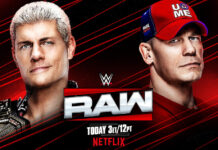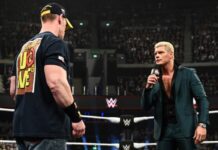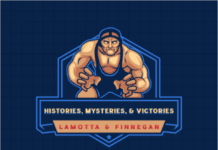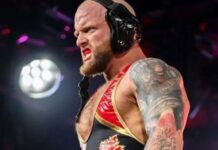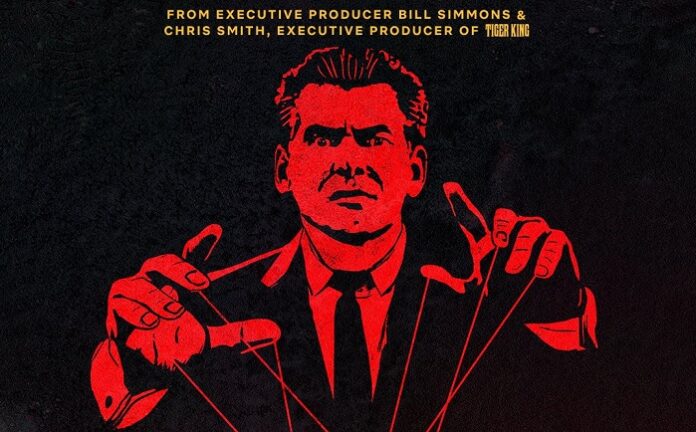
The highly-anticipated Netflix documentary, “Mr. McMahon” was released on the streaming service yesterday, the same platform that will land Monday Night Raw at the start of next year, as well as distribution rights for all of WWE programming outside of the United States. The 10-year deal is worth $5 billion, and perhaps as a way to help facilitate such a deal, maybe that’s why Vince originally agreed to the project when it started production in 2021. That’s one of the biggest questions I had prior to the release of the six-episode docuseries that spans five hours, why exactly would McMahon, a baron that tightly controlled every facet of his product, allow outside producers the chance to potentially spin his story?
The premise of the series”Mr. McMahon” was to determine the difference between the real-life Vince and the Mr. McMahon television character. The only guess I would have might be that with billions of dollars in cash and at his age, it’s possible that Vince thought that this production might humanize him or portray him in a softer light after years of being cast as the ruthless businessman that drove his fellow promoters out of business. One thing is for sure, especially after this documentary, Vince would have Freud on the couch.
More than three and a half years after the production began, especially with the horrendous details that came to light from the lawsuit filed against him by Janel Grant this past January, it’s clear that even if Vince intended to endear himself as someone that came from poverty and a traumatic background to become a billionaire in the entertainment business, it wasn’t a narrative that the audience is going to buy in 2024.
I’m not going to attempt to parse details on more than five hours of content, but there were several topics covered that, at least on the surface, provide glimpses of intrigue, while some portions of this series get bogged down in tired stories that have been covered ad nauseam without providing any insight on McMahon himself, the entire subject of a documentary series that was stretched almost twice as long as it had to be to justify a series rather than just a standalone documentary.
One of the more interesting aspects of the entire presentation is the family dynamics of the McMahons, specifically when Vince talks about his dad, the founder of Capital Sports, Vince Sr. a well-respected promoter by his contemporaries of the era. Mostly in the first episode, Vince details some of his childhood, explaining that he didn’t meet his dad until he was 12, enduring an abusive household prior to that. You’ve probably heard bits and pieces of Vince’s humble upbringing in a trailer park in North Carolina, but there has never been any explanation as to how Vince didn’t meet his father until he was 12 or what happened between his parents. Unfortunately, there aren’t any answers from Netflix either, as Vince claims it was never talked about, but considering that his mom lived to the age of 101, it’s difficult to believe that he wasn’t told something about it at some point in his life. Did Vince’s parents get divorced? Did Vince Sr. not know that he had a son until they met? There are key questions that might provide some insight into who Vince truly is based on his background, but they weren’t answered.
One of the more disturbing details to emerge is the level of abuse that Vince endured from his step father, and it was also briefly implied later in the series that he might’ve been molested by his mother. At one point, Vince even used to terms “abuse and incest” when describing how he tried to put the past behind him to focus on business. Obviously, there’s no excuse for any type of harassment or abuse, if Vince did those horrific acts to Grant or other employees, he should be held responsible. At the same time, Dr. Phil might connect the dots that if Vince was abused and molested as a kid, it could’ve influenced his behavior later in life. Still, similar to his meeting and early relationship with his dad, there aren’t many details about Vince’s mom in the documentary at all, other than a brief clip of her in a wheelchair backstage at a WWE event in her later years.
There’s enough innuendo and some level of implication about Vince’s early childhood, but nothing directly confirmed or concrete, which keeps the narrative murky, even after more than a five-hour presentation.
Along the same lines, there are just brushes of his relationship with Shane, as his son doesn’t directly say that he felt stepped over by Stephanie and Triple H, but vaguely says that there was tension between him and his father when he left the company in 2009. Stephanie is involved, but there’s not much of note that she says throughout any of it, and even Linda’s comments were kept rather brief and mundane. There’s a brief mention of how they met and her comments on different subjects like the steroid trial, but nothing was said about how the two have lived completely separate lives for several years. Vince’s affairs, the relationships he had prior to any of the current allegations, weren’t discussed in any detail either.
Outside of the family, one of the biggest problems I saw with this documentary is that it goes too deep on WWE angles instead of keeping the focus of the subject of the series. Sure, the pressure from WCW influenced Vince as a businessman and that in itself would be an interesting topic, but this production more or less becomes a retelling of WWE history a lot more often than it should’ve if the topic was the owner of the company. We didn’t need verbose accounts of the same tired subjects that were covered several times previously, it doesn’t severe any audience for this documentary. The WWE fans that will tune in already know that the NWO was important in the Monday Night war, they’ve had the chance to see it as recent as the A&E series on WWE. For the general public that might want to watch something about the eccentric billionaire, they don’t care about such niche detail. There’s too much based on the storylines of the Attitude era or the Ruthless Aggression era, simply because it was an unnecessary retread of cliche subjects.
The other major hurdle to go along with that is, there’s undoubtedly meat on the bone so to speak that makes this documentary worth watching, but it’s scattered throughout the five-hour runtime. Nothing is truly concise enough for the audience to get the best content without enduring the WWE history lesson throughout the six episodes. From a macro perspective, the saga of Wrestlemania VII or the downfall of WCW in 2000 isn’t key to Vince’s life story. Sure, buying his competition is a critical piece of the puzzle of his story as a businessman, but there wasn’t a need for extensive clips of WCW. That said, it’s fascinating to see Vince talk candidly about the steroid trial, the Montreal incident, the heart-breaking death of Owen, and the Benoit tragedy. His comments on the early expansion of the WWF, including the stakes of the first Wrestlemania are interesting, but the true insight can be found on the more serious topics.
Vince’s take on nearly all of those topics were what you’d expect so either he actually is a ruthless promoter or he put a PR spin on the answers, which defeats the purpose of the presentation. Vince wasn’t dumb enough to tell his wrestlers that they had to take steroids to work for him, nor would he risk distributing them, he’s too smart for that, but he skates around the fact that the majority of the roster were on anabolic steroids in an attempt to get to the top of the card. Yes, those wrestlers were responsible for their own decisions, but Vince knew that most of the talent were on steroids. The Montreal incident is ultimately what sparked the concept of Mr. McMahon has an on-screen character and if that’s what this documentary is trying to examine then it was a worthy topic. Still, nothing anyone said was something that hadn’t been discussed in a previous production before. However, it was very sad when Bret Hart got emotional when he talked about his brother Owen after the Survivor Series match. Speaking of Owen, Vince doubled down on his decision to continue the pay-per-view after the younger Hart passed in the ring following an equipment malfunction that caused him to fall nearly 90 feet from the rafters. If 25 years later, Vince still doesn’t see how wrong it was to continue a scripted wrestling show when there were blood stains on the canvas because someone died minutes earlier, he might just be as demented as some of his critics think he is. Yes, it was an accident and even Bret acknowledged that was just a terrible accident so he can forgive the company, but the fact that McMahon still contends that the show should’ve continued was disturbing on many levels.
Of course, Vince questions the validity of CTE, suggesting that there wasn’t enough proof, despite the fact that there are numerous cases of athletes that suffered from the brain disease because of head trauma. Keep in mind, the majority of these interviews were filmed in 2021 when Vince was still in control of the company, he wasn’t going to say anything that could’ve been used against him in a potential lawsuit from former talent later on. However, it was very surprising that Steve Austin appears to doubt the legitimacy of CTE when he was asked about the subject. Chris Nowinski, a former WWE talent that was forced out of the ring because of concussions, started a research group on head trauma and was given access to Benoit’s brain to study for signs of CTE. Nowinski started that Chris Benoit had advanced brain disease so at the very least, with the amount of athletes that were diagnosed with it after their death, it confirms that CTE can happen. If CTE is what caused Benoit to kill his family and then himself over the course of a weekend will probably always be a subject of debate. Benoit was a skilled performer just the week before his horrific acts, it’s not as though he didn’t know what was going on or didn’t understand reality. While, it will probably never be known for sure why Benoit killed his family, Vince’s stock answer of “he went crazy” as an explanation to try to doubt the validity of CTE was disingenuous.
The subjects that were interviewed for the piece were hit and miss. It’s fair to include talent like Steve Austin, Hulk Hogan, Bret Hart, The Undertaker, and Cody Rhodes. As mentioned, the McMahon family interview clips were some of the most intriguing portions of the entire production. However, I’m not sure Tony Atlas or even Bruce Prichard were useful talking heads for this show. It’s not as though Tony Atlas is known as being someone in the McMahon inner circle, and is more well-known in the modern era for bizarre social media posts about people walking on his face than anything from his wrestling career. An example of blatant selective editing, when Vince talked about how he enjoyed working with his father, the next clip is Atlas disagreeing with him. How exactly would Tony have known any of that? More than anything, it sounded like Tony Atlas was the gullible old timer that the producers could get the type of responses they wanted to attempt to add some extra controversy to the show. Hulk Hogan was a key piece of the puzzle so it’s more or less required to have him involved, but his track record of absolute falsehoods, many of which he repeated in this documentary, make it very difficult to take anything he said seriously. When Hogan said something outlandish, it hindered an otherwise interesting portion of the series that covered Vince’s early years as a promoter. Prichard is Vince’s right hand man so he was going to tow the company line, which is exactly what Vince himself was going to do so Brother Love’s involvement didn’t really add anything to the presentation.
In the latter portion of the final episode, the documentary covers the previously mentioned scandals, the TKO merger, and that Vince sold his stock in the company after the Janel Grant lawsuit earlier this year. Prior to the release of the show, McMahon posted on social media that the documentary was used to create a misleading narrative, but all things considered, this wasn’t a hatchet job on Vince’s reputation. If anything, it didn’t dive any deeper into the allegations than anything that wasn’t already reported previously by main stream news outlets. It goes without saying that those involved can’t comment on pending litigation, but the point is, the producers merely recounted what was already public. Nothing in this documentary made Vince look any worse than he already made himself look based on what was released in the lawsuit that was filed earlier this year.
As I said, there are some very interesting clips from this documentary, but the entire point was to determine the difference between Vince and Mr. McMahon, and quite frankly, despite six episodes and more than five hours of content, the question isn’t answer in any form or fashion. It’s not even determined that the generic answer of they are the same person is accurate. I understand that Vince is intertwined with WWE, it’s his life’s worth, but the whole concept was to see who Vince was beyond the businessman. This gets too involved with the retelling of WWE storylines than the actual account of Vince’s real life. Either Vince didn’t provide any real details of his life, or the producers left it on the cutting room floor to try to piece together something more controversial. It might’ve been as simple as Vince didn’t truly want to discuss his personal life so the editors had to work with what they had, but for a documentary that had years of production behind it, this was underwhelming. The most interesting clips were of Shane, Stephanie, and the discussion of the family, but that was given the least amount of time of the topics in the documentary.
If six episodes and more than five hours couldn’t answer the question, especially because there was produced outside of the WWE bubble, nobody will probably find out who the real-life Vince McMahon is outside of his television character. Regardless of the viewpoint of this specific documentary, the fact remains that Vince resigned in disgrace, which might be how the public views his legacy.
What do you think? Share your thoughts, opinions, feedback, and anything else that was raised on Twitter @PWMania and Facebook.com/PWMania.
Until next week
-Jim LaMotta
E mail [email protected] | You can follow me on Instagram, Facebook, & Threads @jimlamotta89

